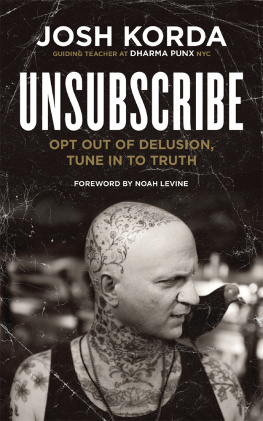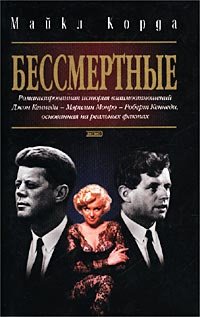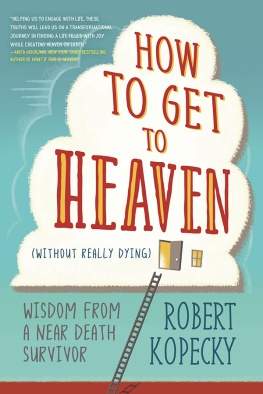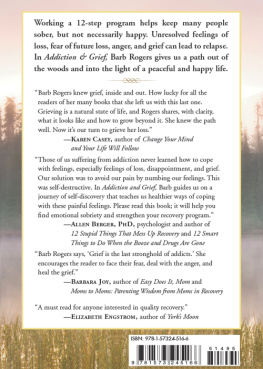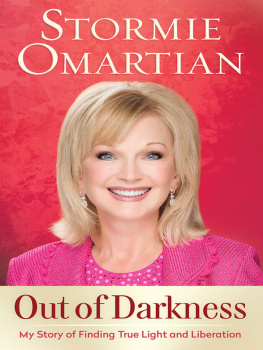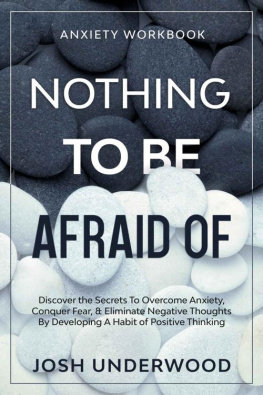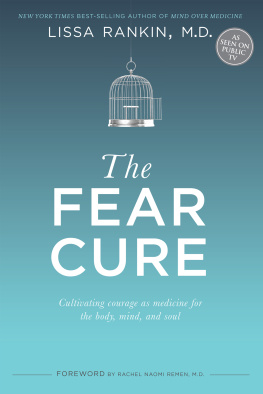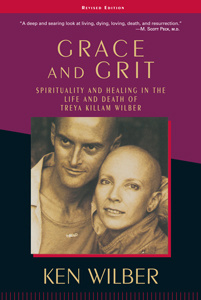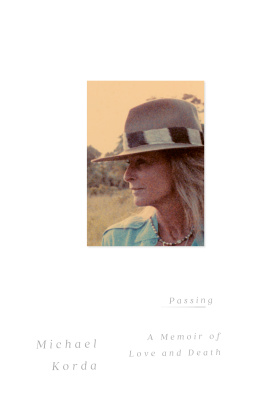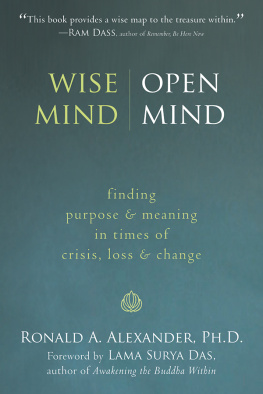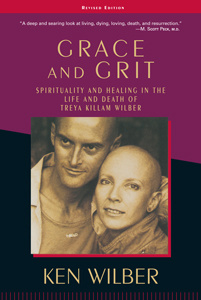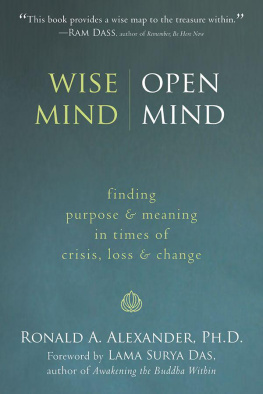MORE PRAISE FOR
UNSUBSCRIBE
Unsubscribe is unvarnished Dharma. With fierce determination and piercing insight, Josh Korda aims to awaken a culture lulled by material comfort and spiritual delusion. Only open this book if you are ready to hear the truth and take on the task of authentic transformation.
KEVIN GRIFFIN ,
author of One Breath at a Time
Inspired. Unsubscribe offers a way to radically change your life into wholehearted being. Read. Explore. Engage!
SENSEI KOSHIN PALEY ELLISON ,
editor of Awake at the Bedside
Josh Korda brings a fresh face to Buddhism. His teachings, grounded in the Theravada tradition, are derived from his personal experience of addiction and recovery. He presents the Dharma in a way that is accessible, engaging, confrontational, and honest. A contemporary sutra for the Dharma-curious and the seasoned practitioner, Unsubscribe offers us the opportunity to see the Buddha Way through a new lens.
SENSEI ROBERT CHODO CAMPBELL ,
New York Zen Center for Contemplative Care
Many of what I consider to be the universal truths are presented in this book, but one thing made Unsubscribe really stand out: this book is blunt. And thats exactly what we need it to be. No flowers, no empty promises, just the honest truth.
MIGUEL CHEN ,
author of I Wanna Be Well and bass player for Teenage Bottlerocket
A no-nonsense psychological road map for anyone who wants to get to the heart of their stuck patterns.
LODRO RINZLER, AUTHOR OF LOVE HURTS
After the 9/11 terrorist attacks, Josh Korda left his high-powered advertising job and a life of drug and alcohol addiction to find a more satisfying way to live. In Unsubscribe, he shares his three-step guide to recovery from addiction to consumerism, self-deception, and life as you thought it had to be:
(1) REPRIORITIZE YOUR GOALS.
(2) UNDERSTAND YOURSELF.
(3) CONNECT AUTHENTICALLY WITH OTHERS.
Revolutionary, compassionate, and filled with wonderfully practical exercises, this book will help you lead a more authentic, fulfilling life.
Josh Korda makes Buddhism relatable and fresh, weaves in neuroscience and psychology, and serves it all up with a heaping dollop of candor, fearlessness, and wit. This book is a how-to guide for people wanting to learn how to face demons, forge deeper connections, sit comfortably in their skin, and step away from the distractions of social media and the mindlessness of consumerism things we all know will never leave us satisfied. Tune in and unsubscribe.
CARA BUCKLEY OF THE NEW YORK TIMES
JOSH KORDA is the guiding teacher of Dharma Punx NYC. His Dharma talks are broadcast weekly on WBAI radio.
LIST OF PRACTICES
FOREWORD
T HE BUDDHAS TEACHINGS are perfect in all ways and will lead any who thoroughly applies them to a profound transformation. Josh Korda is a beautiful example of the transformation that takes place when Buddhist practice (Dharma) is undertaken. The deep personal suffering, trauma, and confusion that led him to the path and practice of recovery, Buddhism, and transformational psychology turned out to be a blessing that he is now sharing with the world.
In the lineage of Dharma Punx, Josh has integrated the rebellious and uncompromising ethic of rejecting the status quo with the disciplined and systematic training of the mind and heart.
As modern American Buddhists we are in the rare and fortunate position to not only receive the Buddhas Dharma, but to also receive the dharma of psychology. With his teachings and this wonderful book, Josh joins the emerging trend of integrating the best practices of Western theorists with the highest wisdom of the Buddha.
Josh shows us through his direct experience the process of healing and awakening. He also has the rare and useful ability to bring humor and levity to this very serious and important process.
Josh and his wife, Kathy, have helped so many thousands of people with their stewardship and guidance of the New York City Dharma Punx and Against the Stream community. Countless beings have also benefited from his podcasting.
I am proud to call him a friend and a colleague. Together may we continue to make the Buddhadharma available to all who seek it.
Noah Levine, author of Dharma Punx, Against the Stream, and Refuge Recovery
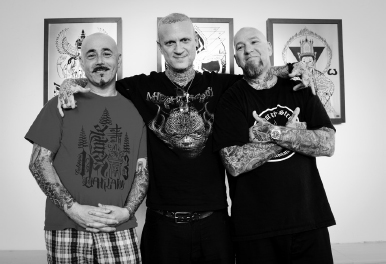
Vinny Ferraro, Josh Korda, and Noah Levine: the three empowered Dharma Punx teachers. Photo by Sarit Rogers.
PREFACE
A S I MAKE SOME final touches to this book in the early days of November 2016, I cannot help but note the storm clouds looming in the background of this endeavor. A recent, ominous cluster of world events: traumatized refugees flee war-ravaged Syria, seeking any form of humane reception by Western countries; Asian financial markets tumble, rattling global markets; a number of far-right-wing nationalist parties throughout Central and Eastern Europe rise in popularity; England startles the world with an isolationist, Brexit vote; the United States, never to be dramatically outperformed, always seeking the spotlight of history, elects a bigoted sexual predator as president.
These words are also forged amid the shadows of essentially mundane, yet still painful personal issues: My sciatica has flared up again, and so the hours spent leaning over my laptop, typing out clusters of words, changing them back and forth with often dispiriting results, causes pain from my lower back to hip to thigh. My elderly cat Iggy lies nearby, in the last stages of life, with 10 percent kidney function, anemia, pressure sores, and infections, requiring intravenous liquids to stay hydrated and drugs to induce an appetite for food; he spends his days in what appears to be end-of-life meditation. Trying to maintain a large but essentially anarchistic Buddhist community in New York offers a recurrent array of obstacles and headaches; space usage fees for our meetings continue to spiral, yet our practitioners are often financially struggling, and I, as a Buddhist teacher, live entirely off their contributions. It can be a mess.
In the hours I set aside to assist and comfort individuals from the New York Dharma Punx community with the tools of the Dharma, I am confronted with a multitude of symptoms: PTSD, hypervigilance, dissociation, addiction, chronic depression, self-harm, and so on, invariably stemming from some form of childhood developmental challenges or abuse. These practitioners are no different from me, emotionally activated by the inevitable setbacks of life, as well as the ongoing parade of disturbing news headlines.
But my goal here is not to depress the reader. All of the aforementioned challenges and concerns, mundane or otherwise, embody the core theme of these pages: All of us suffer, and by trying to achieve peace of mind and security by trudging down capitalisms Yellow Brick Road of workaholism, careerism, consumerism, fame seeking, and social-media-reputation fixation, we waste what little time we have, and wind up absolutely nowhere, not even treated to a glittering, extravagant spectacle such as Oz. Trying to acquire or achieve security and serenity keeps the economy buzzing, chews up our resources, and turns us into competitors, mistrusting each other, viewing each other as obstacles, fighting over slices of an ever-dwindling cake.
Still, some might retort, if I play the game well, my efforts may be paid off handsomely; Ill live in a lavish Tribeca condo, complete with a heated rooftop pool with stunning views, lower level parking, fitness centers, a steam room. Yet such a reward offers little, if any, protection from the vagaries of the cosmos. As the Dharma so consistently notes, the world has always been a dangerously unstable place where rampaging calamities spring out of the blue; ones health can fail at any time, fame abruptly shifts its spotlight to others, wealth can be quickly depleted via sudden market downturns, our reputations can be ruined by gossip. Its all so utterly beyond our control. Note how the Buddhas follower Ratthapala, in the sutta bearing his name, summarized the teachings when asked by King Koravya:
Next page
